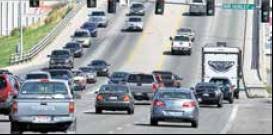Press Release
DOUG LINDLEY/IDAHO STATE JOURNAL
BOISE – Despite the prospect that autonomous vehicles will be safer, more efficient, and more convenient than their human-driven counterparts, three in four U.S. drivers (78%) say they aren’t confident of sharing the road with driverless vehicles. Not yet, at least.
Findings in the new AAA survey mirror those from a similar 2016 study, with nearly eight in ten respondents still expressing fear about fully self-driving vehicles. But the survey also shows that 59 percent of Americans are eager to buy vehicles equipped with autonomous technology.
“Motorists may not be ready to take the plunge on autonomous technology, but they’re definitely willing to wade in slowly,” said AAA Idaho spokesman Matthew Conde. That Americans share a little trepidation and excitement about future vehicle technologies suggests there’s some healthy skepticism in the marketplace, Conde said.
For instance, driver assistance technologies such as lane control assist, rear view mirrors, and blind spot alerts do not work consistently enough from carmaker to carmaker to replace a human driver, according to Greg Brannon, director of AAA Automotive Engineering and Industry Relations.
“While these technologies will continue to improve over time, it’s important that consumers understand that today’s systems still require your eyes to be on the road and your hands on the wheel,” Brannon said.
AAA urges a gradual, safe introduction of driverless vehicles to ensure American drivers become informed and comfortable with this shift in mobility. “As long as we commit to getting our hands dirty with the technology before full-scale deployment, we’ll be much more comfortable with the risks and rewards,” Conde said.
Key survey results:
* 78 percent of U.S. drivers would be afraid to ride a self-driving vehicle
* 54 percent feel less safe about the prospect of sharing roads with a self-driving vehicle
* 81 percent say automated vehicle systems should work similarly regardless of manufacturer
* Women (58%) are more likely to be afraid to drive in a self-driving vehicle; men (49%)
* Baby Boomers (60%) are more likely to feel less safe than Gen X-ers (56%) or Millennials (41%)
AAA’s Brannon says experience with developing technologies will most likely ease driver fears. He also notes that the AAA testing of autonomous technology shows that existing systems do not perform flawlessly and that in their current form these technologies do not replace safe driving practices and an engaged driver.
AAA also notes that approximately 35,000 people die on America’s roadways every year, most as a result of human error. Connected and automated vehicle technologies have the potential to dramatically reduce these numbers. “That’s why automakers, government agencies and safety organizations like AAA must continue working together to make sure these new vehicles are safely tested and deployed,” Conde said.





